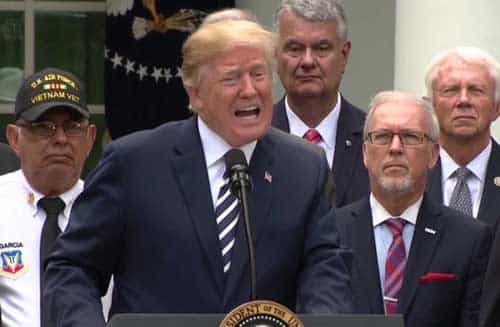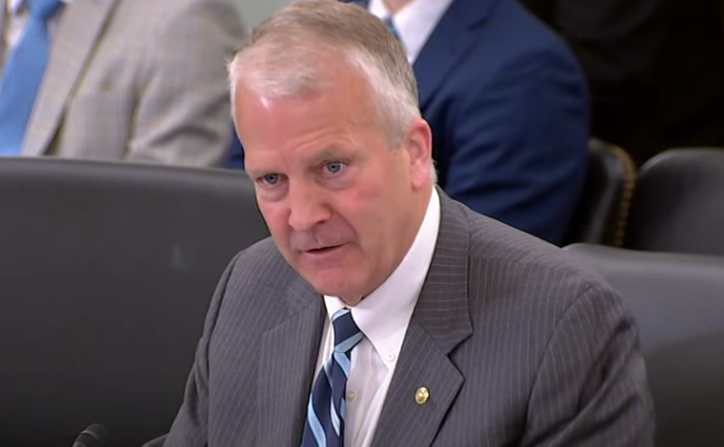WASHINGTON—U.S. Senator Dan Sullivan (R-Alaska), a member of the Senate Veterans Affairs Committee (SVAC), received commitments from former Representative Doug Collins (R-Ga.), President Trump’s nominee to serve as secretary of veterans affairs, regarding critical priorities for Alaska veterans. Specifically, Congressman Collins committed to coming to Alaska, working to re-establish a VA call center in Alaska, resolving the backlog of thousands of veterans nationwide seeking care, and working with Alaska Native health organizations to better serve veterans in rural areas of the state.
A full transcript of Senator Sullivan’s questioning is available below.
DAN SULLIVAN: Congressman Collins, congratulations to you. Thank you to your wonderful, beautiful family there behind you. It’s great that you’re doing this. I certainly agree with my good friend Kevin Cramer in his opening remarks.
I think you are eminently qualified, eminently qualified as a veteran yourself and as a chaplain. I agree with Senator Cramer– that brings some real unique insights. I think that’s going to be great, and I look forward to strongly supporting your confirmation. I’m a big fan, and I certainly hope that we have bipartisan support for your confirmation given your qualifications. Thanks for your willingness to serve.
I appreciate our meeting. As you know, I focused a lot on Alaska for really important reasons. My state has more veterans per capita than any state in the country. It’s a real patriotic place way up north. And we’re big. Talking about big states– I won’t even get in the size of Alaska because I don’t want to embarrass anybody, but it’s really, really, really, really big.
Tim Sheehy left, but I think we’re 5 or 6 times bigger than Montana, and we don’t have one full service veteran hospital, not one. It’s us and New Hampshire. That’s it. So we have really big challenges for all those reasons. It’s good, because we have so many veterans, but it’s challenging because we’re big and we don’t even have one full service hospital.
So we’ve had many disasters, in my view, with the VA. You and I talked about some of them. In 2015 right when I came to the Senate, when the VA system in Alaska collapsed. That was the first big thing I dealt with as a brand new senator. It collapsed because they realigned these VISNs. They took the VISN and the call center in Alaska, out of Alaska.
We had people making appointments for Alaska veterans based in the lower 48 who didn’t have a clue about our state. The system collapsed. We had a giant backlog. Last year believe it or not, the backlog was up to 12,000 veterans, which is a lot for my state, because we still have call centers based in the lower 48.
If a veteran in Ketchikan, Alaska says, hey, I need to get to the Anchorage hospital, the call centers say, okay, drive to well– wait, it’s an island. They don’t even know that Ketchikan is an island. So I need to get a commitment from you.
And the Mission Act: I was able to get legislation that said, if you don’t have a full service hospital—which is only Alaska and New Hampshire– then you can go immediately to community care. Why wouldn’t you? The call centers don’t allow that because they don’t know about Alaska. They don’t know the bill. They don’t know the law. It’s still kind of a disaster for my veterans. So can I get your commitment to work with me on all the Alaska challenges?
But this call center issue, we need one badly. We need to bring a call center back to my state with people who understand what the state’s all about and to help bring down this very big backlog. So can I get your commitment on that, Congressman, to help our veterans and of course, to get your commitment to come up to Alaska?
You can bring the whole family, come up this summer, if you want you can go fishing or come in the winter. Maybe see what it’s like to be in a state that’s dark and 50 below zero. So either way, your choice. You may pick August as opposed to February.
DOUG COLLINS: I appreciate you make it somewhat sound attractive there. Part of our work in the Air Force putting our chaplains up in your beautiful state, that is one of our issues, that long winter.
You brought out a point when you were talking about this and the uniqueness of Alaska and New Hampshire and not having a full service hospital. They are much more of a user of community care. It is really disturbing to me that there are 5000 Alaskan veteran– I believe it was last time we were talking– waiting for health benefits.
This is not a benefit backlog. This is a health care backlog. That means there’s 5000 souls that are there not getting help.
SULLIVAN: By the way, last summer it was up to 12,000. I think the outgoing secretary was trying to get that down, but 12,000 were just waiting to get an appointment, because we got someone in the lower 48 who’s never been to Alaska trying to make an appointment for an Alaska veteran.
COLLINS: I agree, it’s a disaster. When you told me that, it surprised me. And it’s something we’ve got to look at. Sometimes things get lost in bureaucracy and you think it looks good but then after the actual real world application, you have to go back and make changes. I’m willing to commit to you to look at that and see if we can make it better so that they understand that Ketchikan’s an island and they can’t drive to Anchorage.
SULLIVAN: Let me ask one final question very quickly. We talked about it. Our Alaska Native community is also incredibly patriotic, where Alaska Natives serve at higher rates in the military than any other ethnic group in the country. So super patriotic. They live in a lot of our rural communities, and our Alaska Native health care organizations have reach into the rural parts of the state that no other place does.
The VA has a long history of working with our Alaska Native health organizations to extend the reach of care into very rural parts of Alaska and partner to get Alaska Native veterans, but also non-Natives who live in these rural communities, to go to an Alaska Native health organization to get care because they’ve partnered with the VA. Can I get your commitment to continue that good relationship?
Sometimes it’s a little contentious with negotiating the agreements, but it’s really worth it to expand and extend VA health care for Native Alaskans, non-Native Alaskans in the most rural parts of our state.
COLLINS: Senator, yes, I’m willing to commit to do that also in any other district across this country where we can partner to make sure our veterans are getting health care that they need, and especially in a unique situation like that.
###[content id=”79272″]








